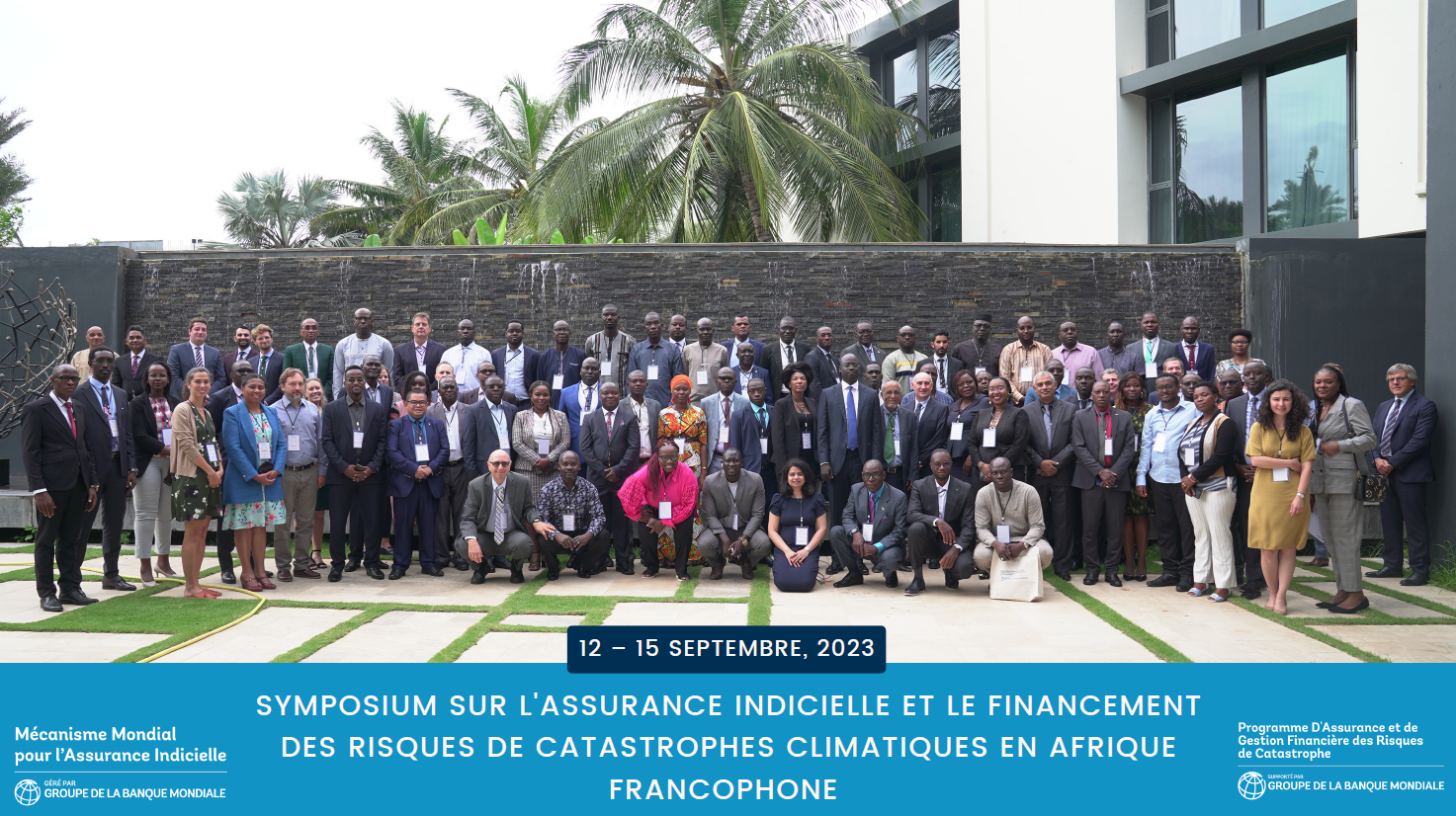[Recap of Knowledge Exchange Program] Symposium On Index Insurance And Disaster Risk Financing In French-Speaking Africa

West Africa countries face increasing frequency and intensity of climatic shocks and natural disasters due to climate change, threatening to roll back development gains and undermine efforts to end extreme poverty and boost shared prosperity. Increasingly, these disasters contribute to unprecedented levels of food insecurity, migration, and conflict. Agriculture sector is an important pillar of the economy in these countries and remains vulnerable to climatic shocks such as droughts and floods which impact on productive assets and can also impact the local and regional economy through knock-on impacts on incomes, prices, financial sector liquidity and credit, and output. According to West African Economic and Monetary Union (WAEMU), average annual losses in members countries are estimated at USD 2 billion (around 1.5% of regional GDP), due to production deficits agricultural sector linked to droughts and floods, infrastructure damage and economic losses in the electricity, water, transport and supply chains sectors (WB Report on the Stability of the Financial System of the UEMOA in 2022). Risk transfer instruments have been used worldwide with the aim of increasing the financial resilience of countries, rural households, and businesses, including increasingly in developing countries for which agricultural activity is a key driver of jobs, economic output, and food security.
After more than a decade of support and a growing demand in West Africa region, the World Bank Group's Disaster Risk Financing and Insurance Program (DRFIP), supported by World Bank’s Global Index Insurance Facility (GIIF) Program, in collaboration with African Risk Capacity (ARC) Group, organized a Symposium on index insurance and disaster risk financing in French-speaking Africa from 12 to 15 September, 2023 in Dakar, Senegal and hosted over 100 delegates and stakeholders from 15+ countries across Africa. The entire program was conducted in French language.
Program Objectives:
- Share knowledge and enhance understanding of climate and disaster risk financing (DRF) strategies, solutions and risk financing instruments with a focus on agriculture DRF
- Facilitate knowledge sharing and best practices in topics related to agriculture DRF
- Initiate discussions and next steps towards designing and implementing risk finance programs
Opening remarks
The Symposium began with opening remarks from Ms. Fatou Assah (Global Head, Financial Institutions Group Advisory, International Finance Corporation (IFC)), Mr. Olivier Mahul (Practice Manager, Disaster Risk Finance and Insurance Program, Finance, Competitiveness & Innovation Global Practice, World Bank Group) and Mr. Bassirou Sarr, Technical Advisor to the Minister of Finance and Budget (MFB), Government of Senegal.

Here is a brief overview of the Symposium held in Senegal.
Day 1:
- Day 1 focused on fundamentals of disaster risk financing. The various sessions discussed principles of DRF and the various DRF instruments i.e. contingency funds, budget reallocation, contingent credit and risk transfer. The final session of the program discussed diagnosis and DRF strategy.
Day 2:
- Day 2 started with overview of Global Index Insurance Facility (GIIF) followed by various sessions diving deep into agriculture DRF. The sessions included deep dive into institutional arrangements as well as case studies and feasibility studies especially in Sahel region. Day 2 also discussed the World Bank funded project “De-risking, Inclusion and Value Enhancement of Pastoral Economies (DRIVE) project”.
Day 3:
- Day 3 focused on agriculture insurance. The sessions included approaches to agriculture insurance, scalability and sustainability of agriculture insurance and importance of data and analytics in success of agriculture insurance.
Day 4:
- Day 4 concluded with in-depth discussion on learnings, experience sharing, and next steps for the participating countries to initiate and strengthen their disaster risk finance agenda for sustainable development and growth in the face of climate risks.
Note: During the deep dive sessions from day 2, country delegates from Uganda, Zambia, Madagascar, Democratic Republic of Congo, Senegal, Kenya as well as private sector stakeholders presented country specific experiences related to different topics covered in the various sessions.
Closing remarks
Douglas Pearce (Practice Manager, Finance, Competitiveness and Innovation Global Practice, World Bank Group) provided closing remarks. He emphasized the importance of disaster risk financing and reiterated how opportunities like the symposium helped enrich and refresh knowledge on the subject around risk financing, allowing an opportunity to the participating delegates to network and learn from other country experiences as well. He also pointed out the importance of continuing the dialogue and learning beyond the symposium.
The training sessions were conducted by professionals and practitioners of disaster risk financing from within as well as outside the World Bank including African Risk Capacity (ARC) Group, World Food Programme (WFP), International Livestock Research Institute (ILRI), Yellen Insurance, Compagnie Nationale d'Assurance Agricole du Sénégal (CNAAS), La Banque Agricole du Sénégal, Direction Nationale des Assurances-Sénégal, Mayfair Insurance Company, Acre Africa, FISP-Zambia, Uganda Agriculture Insurance Scheme (UAIS), Zep-Re, 50x2030 Initiative, and Gallagher Re Limited. The event served as a valuable platform for the sharing of knowledge and was successful in bringing together a community of champions in the field of disaster risk financing. Participants were awarded a certificate at the end of the workshop.
Evaluation and feedback
Overall, the symposium was rated either “excellent” or “very good” by over 95% of the delegates. The “Fundamentals of Disaster Risk Financing” and “Disaster Risk Financing for Agriculture” sessions were particularly well-received, with around 90% delegates stating that they were “excellent” or “very good”. Most participants found the country experience sharing presentations engaging and insightful. In terms of the overall relevance of the master class, 90% participants felt that the program was “very relevant” and would recommend their colleagues for similar programs. Finally, there was a call for more sessions centered on the sharing of country experiences.
Post Program Resources
You can access the program agenda and presentations here. Note all presentations are in French language.